Last term saw Special Collections being used extensively in projects pursuing the Provost’s Connected Curriculum initiative aimed at introducing taught-course students to learning through research. Related public events included ‘The Life Of Moses Gaster In 10 Objects’, a joint student-librarian presentation, described elsewhere in this newsletter, on the fascinating Anglo-Jewish Gaster Archive.
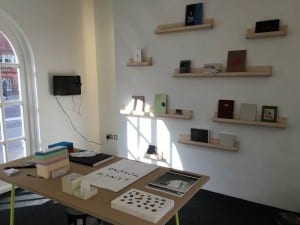
Small Press Project Exhibition North Lodge
Other Connected Curriculum projects involving the collections included one at the Slade School of Fine Art’s Small Press Project, for which staff and students produced their own work based on Special Collections’ rare C20th Small Press and Little Magazines Collections. Thanks to the hard work of Liz Lawes, the Librarian who curates these collections, Sarah Pickering (Slade Teaching Fellow in Photography), and Lesley Sharpe (Slade Teaching Fellow in Print) the project culminated in a conference exhibiting both Slade and Special Collections’ works side by side. The event was attended by artists and academics from art colleges across London and beyond. Items displayed from our collections included work by Andy Warhol and an early piece of student writing by Angela Carter. We even got to meet a relative of a founding contributor to one of the key titles in the collection. In partnership with UCL Museums & Collections Liz Lawes was also involved in a project with MA Museum Studies students which involved them writing a report on Blast magazine as a result of their object-based study for the Collections Curatorship module.
 We were proud to note that UCL’s Teaching And Learning Conference over the Spring break included four talks by academic staff on Special Collections’ collaborations for the Connected Curriculum initiative: From Codex To Kindle, a module for languages students exploring the nature of the book inspired by a wide range of Special Collections specimens, after which some students went on to volunteer with Special Collections to prepare exhibitions on this theme for the UCL Senate House Hub; a module for Scandinavian Studies using photographs, letters and other archival material from Special Collections as a basis for language-based projects; a course on Fin de Siècle and criminology history, for which students wrote a thoughtful blog after studying Special Collections items from the collections of Darwin’s cousin, Francis Galton (some of which were digitised for a Wellcome Library project); and the BASc’s object-based learning module, for which students presented online exhibitions based on their research on individual items from the collections. Many thanks to all the Special Collections team for the hard work it takes to make these and the term’s other teaching collaborations successful.
We were proud to note that UCL’s Teaching And Learning Conference over the Spring break included four talks by academic staff on Special Collections’ collaborations for the Connected Curriculum initiative: From Codex To Kindle, a module for languages students exploring the nature of the book inspired by a wide range of Special Collections specimens, after which some students went on to volunteer with Special Collections to prepare exhibitions on this theme for the UCL Senate House Hub; a module for Scandinavian Studies using photographs, letters and other archival material from Special Collections as a basis for language-based projects; a course on Fin de Siècle and criminology history, for which students wrote a thoughtful blog after studying Special Collections items from the collections of Darwin’s cousin, Francis Galton (some of which were digitised for a Wellcome Library project); and the BASc’s object-based learning module, for which students presented online exhibitions based on their research on individual items from the collections. Many thanks to all the Special Collections team for the hard work it takes to make these and the term’s other teaching collaborations successful.
Other events included contributions to talks at the Courtauld Institute’s exhibition of Botticelli’s Dante drawings (we hold a copy of the 1481 printed edition of the Divina Commedia with Botticelli’s illustrations) and a research workshop with a London Library staff member on Dante incunabula, following last year’s highly successful four-day festival celebrating the 750th anniversary of Dante’s birth.
For the summer term we have an exciting programme of free events and exhibitions open to the public, as well as planned contributions to exhibitions at London’s Globe Theatre and in Barcelona and Aragon in Spain. If you would like to see some of our collections up close, try choosing from the list below.
UCL Special Collections Calendar
Events
A workshop on poison: an anti-visual strategy
Wednesday 11 May, 1-2pm, Rock Room, Room 4, 1st floor corridor, South Wing, UCL, Gower St, WC1E 6BT. Drop in.
- A small display of early and rare printed books on the theme of poison, presented by graduate students of sculpture from the Slade School Of Fine Art. Herbals, books on plants and spiders, and medical books all featured.
Scandinavian student projects
Wednesday 25 May, 1-4pm, Art Museum, Main Building, UCL, Gower St, WC1E 6BT. Drop in.
- As part of the UCL Festival of Culture, Scandinavian Studies students displayed archival material and talked about their research in Special Collections’ archives looking at items relating to Scandinavian language and history.
Shakespeare 400
Friday 27 May, 1-4pm, Art Museum, Main Building, UCL, Gower St, WC1E 6BT. Drop in.
- English literature students displayed items from Special Collections and the Art Museum related to Shakespeare, to mark the 400th anniversary of his death. In addition, library staff took tours from the Art Museum up to the Main Library to see the exhibition Fair Play And Foul: Connecting With Shakespeare At UCL, which includes some of our famous Shakespeare forgeries.
Exhibitions
Dictionaries, forgeries and school aids marking the Shakespeare400 anniversary of 2016.
Main Library, UCL Gower Street, London, until 15 December 2016
Medical Treasures
Examples of the range of Special Collections’ medical material, from the first illustration of a leg amputation through Vesalius’ ground-breaking Renaissance anatomy textbook to more recent cartoons
UCL Cruciform Hub, Gower Street, London. Permanent.
What is paper? What is a book? What is the difference between a physical and an e-book? Student projects on the history of the book
Research-based projects put together by students volunteering with UCL Special Collections, illustrating their tools, techniques, and thoughts on using rare books and archives alongside digitised and e-books.
UCL Senate House Hub, 3rd floor Senate House, Malet Street, London, from 23 May 2016 (access to UCL staff and students only)
Dr. Tabitha Tuckett, Rare-Books Librarian
 Close
Close


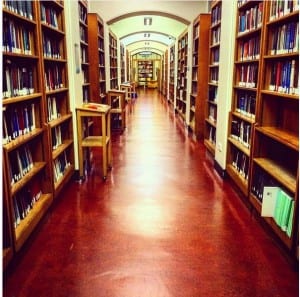

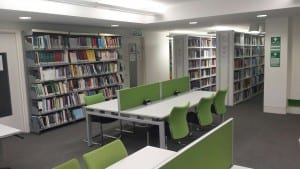 LASS refurbishment and installation of new desks – 10 spaces
LASS refurbishment and installation of new desks – 10 spaces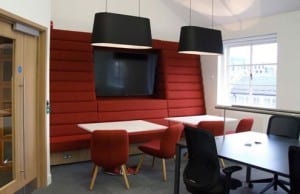 We were asked for special areas dedicated to postgraduate study and research so we gained some temporary space in Main Library until the Research Grid opened in the Science Library earlier this year with 74 seats equipped with many features requested by graduate students during consultation at the design stage. We also manage the Graduate Hub with 51 spaces behind the Print Room Cafe as well as liasing with UCL ISD on increasing capacity in the Postgraduate Cluster in the Science Library.
We were asked for special areas dedicated to postgraduate study and research so we gained some temporary space in Main Library until the Research Grid opened in the Science Library earlier this year with 74 seats equipped with many features requested by graduate students during consultation at the design stage. We also manage the Graduate Hub with 51 spaces behind the Print Room Cafe as well as liasing with UCL ISD on increasing capacity in the Postgraduate Cluster in the Science Library. Rachel Nelligan, Customer Service Manager Main Library and Wilkins Building, was nominated for her managerial skills, exhibiting care, encouragement and support towards colleagues.
Rachel Nelligan, Customer Service Manager Main Library and Wilkins Building, was nominated for her managerial skills, exhibiting care, encouragement and support towards colleagues. I am delighted to report that the UCL Library Services Leadership Team has been shortlisted for the prestigious
I am delighted to report that the UCL Library Services Leadership Team has been shortlisted for the prestigious  I am an E-Resources Librarian, part of the team that looks after UCL’s access to
I am an E-Resources Librarian, part of the team that looks after UCL’s access to 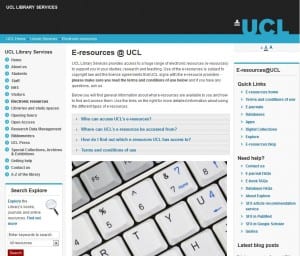
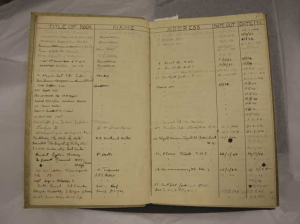
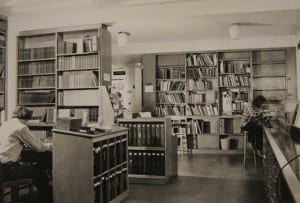 For more about the Library’s history and colourful characters, including Colonel Browne, its first librarian, adept party fund-raiser and lover of Kipling’s poetry, see the full online article in Archaeology International 18 (2015): ‘
For more about the Library’s history and colourful characters, including Colonel Browne, its first librarian, adept party fund-raiser and lover of Kipling’s poetry, see the full online article in Archaeology International 18 (2015): ‘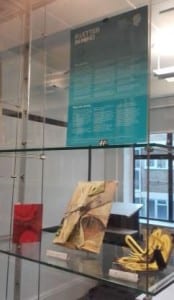 Queen Square Library ‘s recent exhibition:
Queen Square Library ‘s recent exhibition: 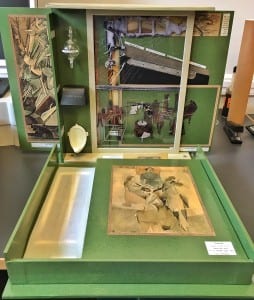 One of the many key roles of a Subject Liaison Librarian is collection development. In Art, this involves being on the ball as things are often published in small editions and go out of print very quickly. I was therefore pleased to get my hands on a copy of this new reconceptualisation of Marcel Duchamp’s legendary book-object Boîte-en-valise.
One of the many key roles of a Subject Liaison Librarian is collection development. In Art, this involves being on the ball as things are often published in small editions and go out of print very quickly. I was therefore pleased to get my hands on a copy of this new reconceptualisation of Marcel Duchamp’s legendary book-object Boîte-en-valise.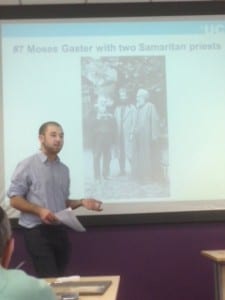 As part of the
As part of the 
 We were proud to note that UCL’s
We were proud to note that UCL’s 